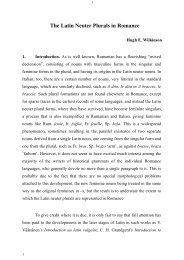THE STRONG PERFECTS IN THE ROMANCE ... - Page ON
THE STRONG PERFECTS IN THE ROMANCE ... - Page ON
THE STRONG PERFECTS IN THE ROMANCE ... - Page ON
Create successful ePaper yourself
Turn your PDF publications into a flip-book with our unique Google optimized e-Paper software.
-ĭtus tended to develop for -ui perfects, on the model of future participles<br />
such as caniturus, bibiturus, nasciturus, moriturus, ruiturus, so bibitus,<br />
parcitus (with parsus matching parsi), tollitus, impulitus, vincitus,<br />
lambitus, with traces of the approaching change to -ūtus as well.<br />
5. The -ui perfects which survived in Romance. The chief verbs to<br />
have survived to later times with -ui perfects or the equivalent are: iacere,<br />
placere, tacere, licere, nocere, decere (slight traces in It.), habere, debere,<br />
movere, calere, dolere, olere, solere, valere, parere, tenere, sedere, (in<br />
part videre, implere, (sub)monere), cadere, capere, sapere, posse, velle<br />
(all showing -ēre infinitives on the whole); fremere, gemere, tremere,<br />
timere, vomere, (in part premere, redimere), recipere and the other<br />
-cipere verbs, eripere, attribuere, battuere, fut(t)uere, consuere,<br />
conspuere, bibere, fervere, pluere, rumpere, lambere, vincere, (in part<br />
sequi, vertere), cognoscere, crescere, pascere, experg(isc)ere, irasci,<br />
nasci, miscere, texere, (in part vivere), colere, molere, (in part tollere,<br />
solvere, volvere, frangere, legere, eligere, trahere, traicere, credere,<br />
currere), cernere, sternere, with infinitives in -ĕre for the most part<br />
(timēre, miscēre were largely attracted); and in the -īre conjugation<br />
venīre, with a few other verbs that show isolated forms. Of these, as we<br />
have seen above, those with classical -ui perfects remain largely<br />
unchanged in late Latin (except for, e.g., forms like tenerit, volerit,<br />
poterit), in fact, considering the amount of fluctuation in general, they<br />
form a very stable block, so we would be justified in expecting -ui<br />
forms in the daughter languages. The late Latin fluctuations are found<br />
for the most part in the verbs which adopted -ui forms later, so here<br />
we might expect a variety of forms in the Romance languages.<br />
16









